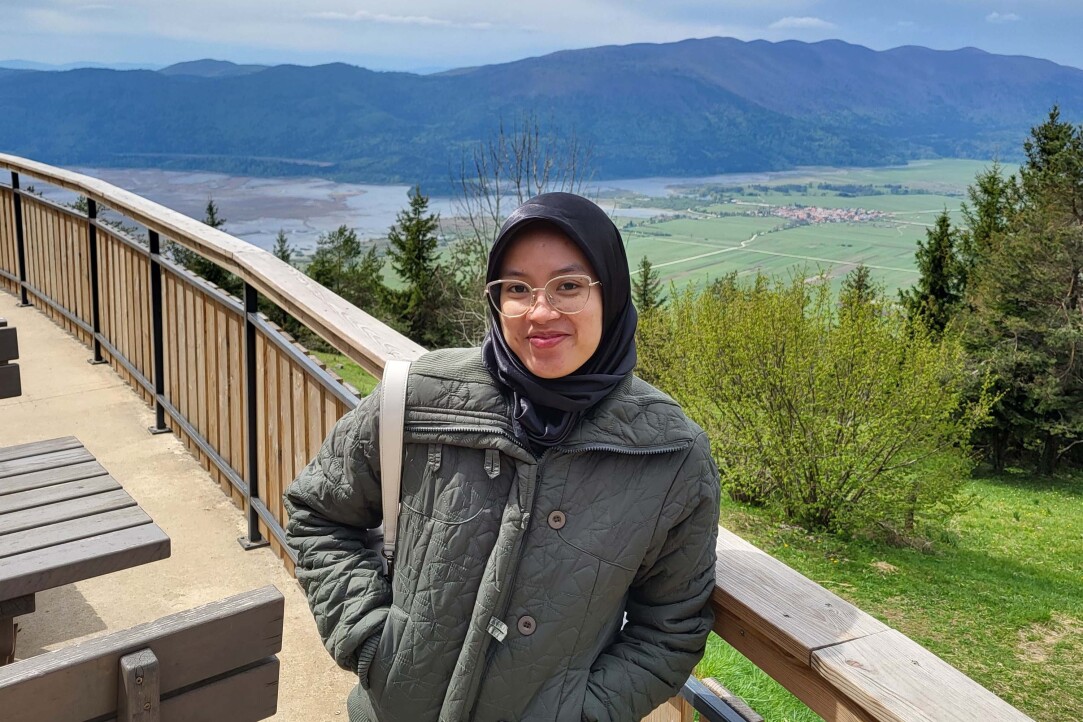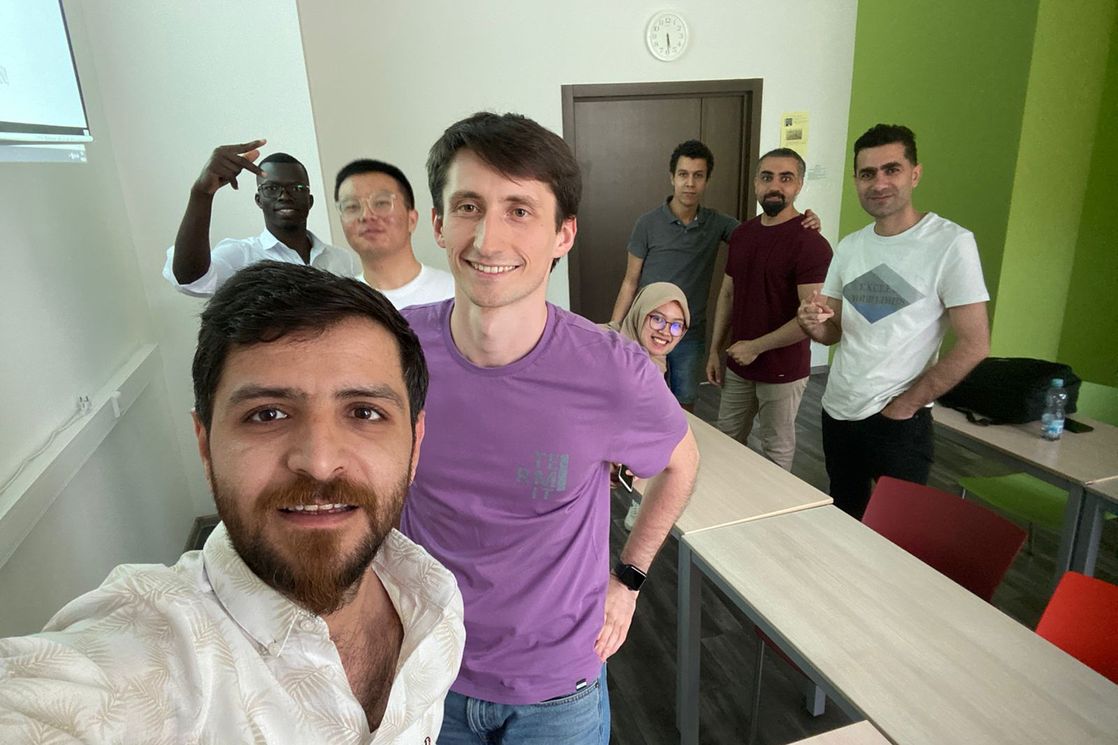‘My Advice to International Students: Be Open-Minded and Willing to Adapt!’

Adila Ulfia Maula Tontowi is a third-year student of the Bachelor’s in Foreign Languages and Intercultural Communication. After moving from her hometown in Indonesia to France for a year, she decided to broaden her horizons even further and study at HSE University in Moscow. In this interview, Maula talks about navigating intercultural interactions, how the International Prep Year helped her adapt to life in Russia, and what she’s learned about traditional Russian celebrations like Maslenitsa—which is taking place this week.
— How did you end up studying in Russia?
— When I was in my second year of high school in Indonesia, I did a one-year exchange programme in France, where I got to learn French and immerse myself in the local culture. This experience motivated me to pursue my education abroad. As for why Russia specifically, people in Indonesia still don’t know a lot about Russia and life here, which makes the idea of studying in Russia even more intriguing and interesting to me.
I did a little research on HSE and found only good things: that it is one of the best universities in Russia, a progressive university, and very welcoming of foreigners
I applied for a scholarship through the HSE Olympiad and decided to enrol in Foreign Languages and Intercultural Communication.
I have always been interested in learning foreign languages—English and French before, but I am currently studying Spanish as my second language in the programme. Paired with the knowledge from my Intercultural Communication specialisation, I believe this knowledge of foreign languages can help me pursue a lucrative career in the international job market.

— How is the academic environment at HSE University?
— HSE has a lively and international academic atmosphere that encourages critical thinking and interdisciplinary learning. I like how classes are structured to promote discussion rather than just passive learning. There’s a strong emphasis on research, so students are encouraged to explore their own interests and develop analytical skills.
The Foreign Languages and Intercultural Communication programme is a great fit for my career goals—it gives me the language skills and real-world communication tools needed to work in multicultural environments
The programme has taught me how to analyse language use in different social and cultural contexts, which is valuable for both academic research and real-world applications. I’ve also improved my ability to navigate intercultural interactions, which is crucial for working in cross-cultural settings.
The courses on the different schools of linguistics and intercultural communication have been especially insightful, as they directly relate to my research interests. Some professors have a great way of making complex linguistic concepts easy to understand and apply to real-life situations.
— What will you do next after graduating from your programme?
— Whether I pursue a career in language education, intercultural consulting, or something completely unrelated to linguistics, the knowledge and experiences I’ve gained through this programme will help me navigate diverse cultural and professional settings.
My degree provides me with a strong foundation in linguistics, cross-cultural understanding, and communication strategies—skills that are essential for working in international environments
After graduation, my plan is to find a scholarship for a master’s degree—ideally in another country, so that I can experience living abroad once again.
— How is life in Russia as an international student?
— At first, it was challenging to navigate daily life, especially with the language barrier and different cultural norms. While many people in Moscow speak English, everyday interactions (like shopping or handling paperwork) can still be difficult if you don’t know Russian.
Fortunately, I did the one-year Russian preparatory programme before starting my bachelor’s degree, which helped tremendously with how I navigate daily life here
One thing that surprised me was how Russians still appreciate traditions and enjoy celebrating national holidays. For example, Russians love celebrating Maslenitsa, and have separate holidays for Men’s day and Women’s day, which is something we don’t have in Indonesia. Another thing I found interesting was how most flower shops seem to be open 24/7.
Overall, studying in Russia has broadened my academic knowledge, helped me grow as a person, and made me more open-minded and resilient.
— How important is it for international students to learn Russian?
— Even though right now I’m studying fully in English, Russian is still very valuable—foreign students have to do a lot of bureaucratic processes like the fingerprint procedure, yearly medical checkups, paying for visa extensions, etc.
Knowing Russian really helps you get through all the bureaucratic procedures faster and stress-free
A lot of foreign students plan to settle in Russia even after they finish their studies, so mastering Russian should be one of their top priorities; starting a career in Russia without knowing Russian would be challenging. Regardless of whether they want to settle in Russia or not, Russian will still prove to be important for business, careers, or travel.
— What does your typical day look like?
— My mornings usually start with classes, which can be lectures, seminars, or group discussions, depending on the schedule. After classes, I either grab lunch with friends or spend some time studying in the library.
In the evening, I like to balance my time between the gym (it’s a great way to de-stress) and work, whether it’s tutoring, research, or other projects. After that, I usually unwind by watching something, reading, or catching up with friends and family before calling it a day.
I live in one of HSE’s dorms, and it’s great. The building is relatively new, the furniture is all modern, and we have all the amenities we need
The administration staff is friendly and is happy to help us whenever we need it. The dorm is located five minutes from the metro and there are a lot of shops nearby, so it’s easy to go and buy groceries yourself.
I’m not a big fan of cooking, but it really saves a lot of money and gives me more freedom in deciding what I want to eat. I usually cook simple dishes, a lot of them based on chicken and eggs: scrambled eggs, omelettes, spicy fried eggplants, sweet and sour chicken, teriyaki chicken, and stir fry chicken with tomato sauce.
— What do you like to do in your free time?
— I love the parks in Moscow! In almost four years, I probably still haven’t visited even a third of them. My favourites are Kuzminki Park, Gorky Park, and Tsaritsyno.
I love just strolling around the park and feeling like I am somewhere far away from the city
I am part of the HSE Indonesian Club. We have participated in events like the Culture Cafe and HSE Unity Fest, and we have also held the Garuda festival of Indonesian culture. I am also participating in a project called ‘Cultural Codes of Asian Business Culture.’
I also love crocheting! I haven't done much in the past few months, but it is perfect for the long Russian winters when you just want to be snuggled under a warm blanket, watch a heartwarming TV series, and crochet at the same time.
— How can international students make the most of their time in Russia?
— Be open-minded and willing to adapt! Studying in Russia is a unique, challenging, and incredibly rewarding experience. Take full advantage of HSE’s academic and social opportunities—join student clubs, attend events, and take part in research projects and student conferences. Don’t be afraid to connect with local and international students.
Social media like VK and Telegram are really useful for professional connections, but some of the best networking happens naturally through student clubs, group projects, or just casual meetups at cafés
Russia has a lot of beautiful and interesting places. Students should visit cities other than St Petersburg and Moscow (my personal favourites are Golden Ring cities like Vladimir and Suzdal).
Learning some basic Russian before you arrive will make daily life much easier. Overall, get as much experience while you can—and don’t forget to enjoy your youth in the meantime!
See also:
Indonesian Parliamentary Delegation at HSE: New Prospects for Cooperation
On 24 February, 2025, the HSE campus on Pokrovka hosted a meeting with a delegation from the Committee for Inter-Parliamentary Cooperation of the House of Representatives of the Republic of Indonesia. HSE Vice Rector and Head of the BRICS Expert Council–Russia Victoria Panova took part in the event alongside representatives from the university’s academic departments and research centres. During the meeting, the parties discussed key areas for strengthening academic and expert cooperation, as well as joint initiatives in science and technology, including those within the BRICS framework.
Indonesia Hosts HSE International Olympiad for First Time
HSE University and the Russian House in Indonesia have held the first offline INTO HSE olympiad in Jakarta. It is a new, free event in English for international school students.
HSE University-St Petersburg Presents Its Educational Programmes at International Exhibition in Indonesia
At the end of January, Jakarta (Indonesia) hosted the IIETE 2025 international education and training exhibition. HSE University-St Petersburg and three other Russian universities represented the higher education system in Russia. Over several days, the exhibition welcomed more than 50,000 people.
HSE University in St Petersburg Holds Open Day for Indonesian Students in Jakarta
On 23 September, at the Russian House in Jakarta, the delegation from HSE University in St Petersburg, headed by Director Anna Tyshetskaya, introduced Indonesian school students and their parents to the educational programmes at the university and the opportunities for studying in Russia.
‘Learning to Build a Business, Preserving the Environment, and Being Future-Oriented’
Faiz Arsyad, from Indonesia, has recently received his master’s degree in Agrarian Economics from HSE University. In an interview with the Faculty of Economic Sciences, he shares why he sees this master’s programme as not just a chance to get top-notch education but also an opportunity to dive into different cultures.
‘HSE University Has a Lot to Offer to Applicants from Southeast Asia’
A delegation from HSE University presented the institution at the Indonesia International Education and Training Expo. Additionally, a series of events were organised in Jakarta, the capital city of the country, where representatives from HSE University interacted with Indonesian applicants interested in bachelor's and master's programmes.
MIEM and HSE Design School Meet with Indonesian Game Dev Representatives
In December, the Indie Go space hosted a meeting with representatives of Indonesia’s game development industry. Colleagues from the ‘Game Engineering and Interactive Systems’ workshop of the HSE Tikhonov Moscow Institute of Electronics and Mathematics (MIEM) and the HSE Art and Design School learned about the intricacies of the Indonesian game industry and told the visitors about their own projects.
HSE University Opens Educational Hub in APAC
On November 7, a representative office of HSE University opened in Indonesia. It is a new educational hub for students from the Asia-Pacific (APAC) who are planning to study in Russia, as well as for other Russian universities looking to establish ties with Indonesia. The representative office is based at Sepuluh Nopember Institute of Technology (ITS) in the city of Surabaya. Its operations are supervised by the HSE University campus in St Petersburg.
‘I Am an Insider Who Can Help New Students in an Unfamiliar Country’
HSE University boasts a variety of student clubs and societies: sports clubs, charity organisations, cultural clubs, and many more. Azzahra Afidah Faizah, one of the founders of the HSE Indonesian Club, talks about its activities, objectives, and plans.
Orientation Sessions for International Students: ‘Being at HSE University Today is a Dream Come True’
HSE University’s Support and Career Centre for International Students and Alumni has held orientation sessions for incoming international students. During the meetings, the centre’s experts explained the visa and migration support available, talked about extracurricular student life, and gave tours of the campus and the city.


